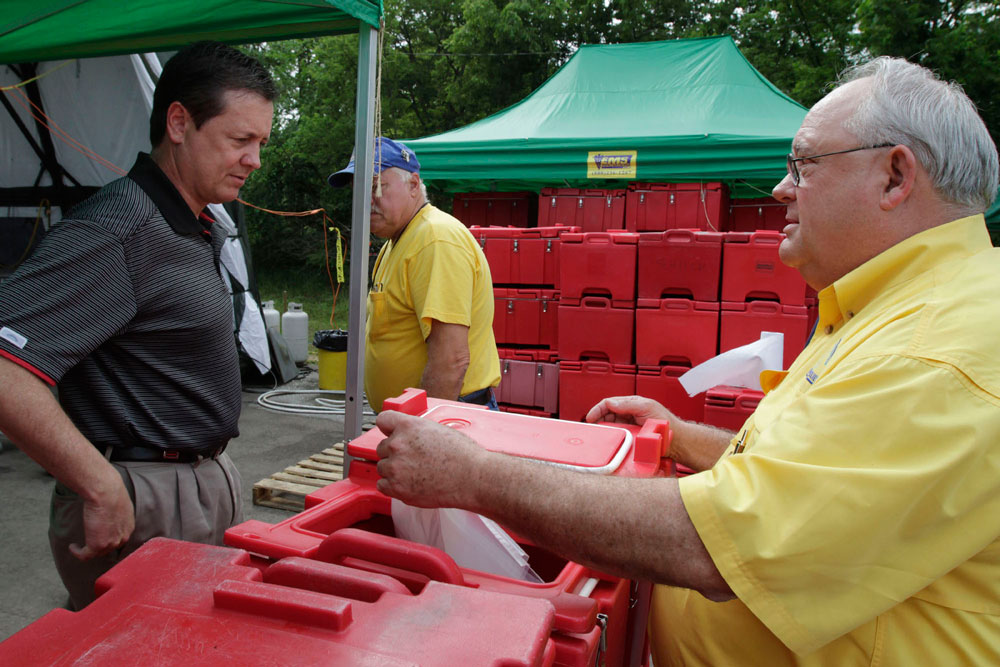
John Swain/NAMB
Mickey Caison (right) surveys portable food containers, called cambros, with North American Mission Board President Kevin Ezell in Tuscaloosa, Ala., in May 2011 following a devastating outbreak of tornadoes.
ALPHARETTA, Ga.—Think back among the most harrowing disasters in recent U.S. history: 9/11, Hurricane Katrina, the Oklahoma City bombing, the Midwest floods of 1993, the Northridge earthquake and Hurricanes Andrew, Harvey and Irma.
Mickey Caison has represented Southern Baptists at each of them.
As national director of Southern Baptist Disaster Relief for most of the past 23 years, Caison has led Baptist volunteers to share the love of Christ during difficult days across the country as well as abroad.
“I had the greatest job in SBC life,” Caison said. “I fell in love with seeing God work in people’s lives. I couldn’t get away from it. I wanted to be there. It’s so powerful to watch.”
Caison officially retired from the North American Mission Board at the end of August, but he is currently in Houston, still serving as part of the Southern Baptist response to Hurricane Harvey. Caison was the last remaining staff member to transition from the former Brotherhood Commission to NAMB when the SBC entity was formed in 1997.
Caison, then a South Carolina pastor, first became aware of SBDR while attending the 1986 Southern Baptist Convention in Atlanta and going through a mobile DR unit set up by Alabama Baptists.
But it wasn’t until three years later that Caison saw firsthand the impact Southern Baptists have in disaster situations. He had been working with local emergency services when Hurricane Hugo hit the area. After seeing the extent of the damage, Caison called the South Carolina Baptist Convention and told them his community needed help. Trucks were already on the way.
For nine months, SBDR volunteers served Caison’s community and helped get people back on their feet. His church and the local fire department fed and housed the volunteers. The church raised about $260,000 to help local families impacted by the disaster.
“We fell into that opportunity to care and love on people beyond the physical, even into the spiritual realm,” Caison said. “God showed me up close and personal what can happen when you tie the command to ‘go and make disciples’ with the command to care for people.”
Caison was hooked. His church worked with the South Carolina Baptist Convention to create the first feeding unit in the state. Caison and a team from his church took the feeding unit to Florida in August 1992 to help with the aftermath of Hurricane Andrew. Though they initially planned to serve 1,500 meals a day, the team stayed in Florida for six weeks and served 15,000 meals a day.
In 1994, after leading several disaster responses when fulltime staff weren’t available, the SBC Brotherhood Commission asked Caison to become SBDR national director.
Caison oversaw one of the most significant innovations in disaster relief a few years later when SBDR began deploying chaplains during 9/11. Caison had seen the value of chaplains during the Southern Baptist response to the 1995 Oklahoma City bombing, as Baptist chaplains in the police department and Federal Bureau of Investigation had responded powerfully to the spiritual needs in the aftermath. When 9/11 hit, Caison called Sam Porter, then-director of Oklahoma Baptist Disaster Relief and now NAMB’s new SBDR national director, and asked him to bring some of the chaplains who had helped at Oklahoma City.
“I saw those chaplains walking the streets in downtown Manhattan, going up to those makeshift memorials, and being in the morgue and at Ground Zero with the cops and the firemen and all,” Caison said. “It was so critical for us to have the chaplains with us to deal with the immense spiritual needs that were there. I knew they needed to be a big part of our future.”
Caison also led SBDR’s efforts in its largest deployment in history after Hurricane Katrina, as Southern Baptists subsequently served more than 15 million meals in New Orleans and southern Mississippi. SBDR also spent five years helping to rebuild the Gulf Coast after the initial response.
Caison said he has seen God work through volunteers in amazing ways during his 30 years in SBDR. He has seen God use the Southern Baptist response to disasters to change not only the lives of those they’re serving, but to transform those who serve as well.
“You know, people say there are no miracles today,” Caison said. “I see them every day as I see what God is doing…. You just have to pay attention. It’s gotten to the point that I know it’s going to happen. I just praise Him when it happens over and over and over again.” (BP)
Tobin Perry